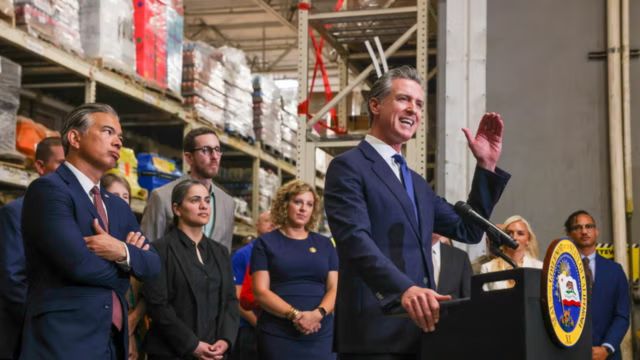WFCN –
Stricter penalties for repeat offenders and individuals running professional resale schemes were included in a bipartisan package of ten legislation that California Gov. Gavin Newsom signed into law on Friday, with the goal of reducing smash-and-grab robberies and property crimes.
A combination of state lawmakers, business executives, and local authorities, including the Democratic governor, were joined at a Home Depot shop in San Jose by a nonpartisan alliance.
“Let’s be clear, this is the most significant legislation to address property crime in modern California history,” Newsom said on the weekend.
For prioritizing public safety before party, I am grateful to the lawmakers, our retail partners, and advocates who worked across the aisle. Our communities will be safer and law enforcement will have more tools to catch criminals and hold them responsible thanks to these new laws, even though others want to return to outdated methods that were both costly and unproductive.
This is happening at a time when Democratic leadership is trying to send a message that they are serious about fighting crime by urging voters to reject Proposition 36. This proposition would make some drug charges and repeat shoplifters felony offenses with heavier penalties.
Numerous incidents of large-scale, smash-and-grab thefts have been recorded on video and shared online, drawing national attention to the alarming increase of retail theft in California and other states. These heists typically involve gangs of people storming into stores and stealing items that are clearly visible.

To achieve the level of felony grand theft and to impose tougher punishments for smash-and-grabs and large-scale resale operations, the law permits prosecutors to combine the value of things stolen from multiple victims across several counties.
A smart and prudent approach gets to the heart of the matter, according to Newsom, who praised the package. “This is the real deal.”
Legislators from all parties approved the package, but on the grounds that it contained measures that were too harsh, a number of progressive Democrats abstained from voting for it.
SEE MORE –
North Carolina Man Pleads Guilty in Multistate Cattle Theft Ring, Costing Over $1 Million
Marketplaces like eBay are required to start collecting bank account and tax identification numbers from high-volume sellers, and the legislation also seeks to curb cargo thefts and fix a legal loophole that makes it simpler to prosecute auto thefts regardless of whether the vehicle was locked.
Stores could be able to get restraining orders against shoplifters who have been found guilty under one law.
Following his punishment for “misgendering” a child predator, a prosecutor in Los Angeles is suing the district attorney in retaliation.
State Senator Nancy Skinner, a Democrat, made it clear that “we know that retail theft has consequences, big and small, physical and financial” when she introduced the measure regarding online marketplaces. “And we know we have to take the right steps in order to stop it without returning to the days of mass incarceration.”
Newsom and other Democrats in the state spent months earlier this year trying to remove Proposition 36, a measure to crack down on crime, on the ballot for the November election, but their attempt was unsuccessful. Instead of going after the ringleaders who employ huge crews to steal products and resell them online, Democrats were concerned that the bill would unfairly penalize low-income individuals and those with addiction problems.
On Friday, Newsom characterized the ballot initiative as “a devastating setback” for California, drawing parallels to the current War on Drugs, which seeks to reduce drug usage by increasing punishments and prison terms for those who commit drug offenses.
“That initiative is about going back to the 1980s and the War on Drugs,” remarked the president. “It’s about mass incarceration.”
Despite spending the last decade advocating progressive policies to invest in rehabilitation programs and depopulate jails and prisons, state Democrats have found it difficult to handle the crime issue in recent years.
Local police departments have received $267 million from Newsom’s administration to aid with increased patrols, surveillance equipment, and prosecutions.
Republicans and police enforcement have been increasingly critical of the issue this year, citing viral recordings of heinous store raids in which gangs of people openly seize merchandise. This has brought the matter to a head. Many Californians are angry about the state’s alleged lack of regulation, which they say has led to an increase in drug usage and shoplifting even as the state struggles with a housing shortage.
Many stores in California do not share their data, making it difficult to quantify the issue of retail crime. However, those who advocate for a tough stance on crime point to significant store closures and the fact that products like toothpaste and deodorant are locked behind plexiglass as proof that the problem has reached a crisis level.
Los Angeles and the San Francisco Bay Area had a consistent rise in shoplifting from 2021 to 2022, according to a study conducted by the non-partisan Public Policy Institute of California.
Nearly 3,000 individuals have been apprehended and $45 million worth of stolen property has been recovered by the California Highway Patrol since 2019.
